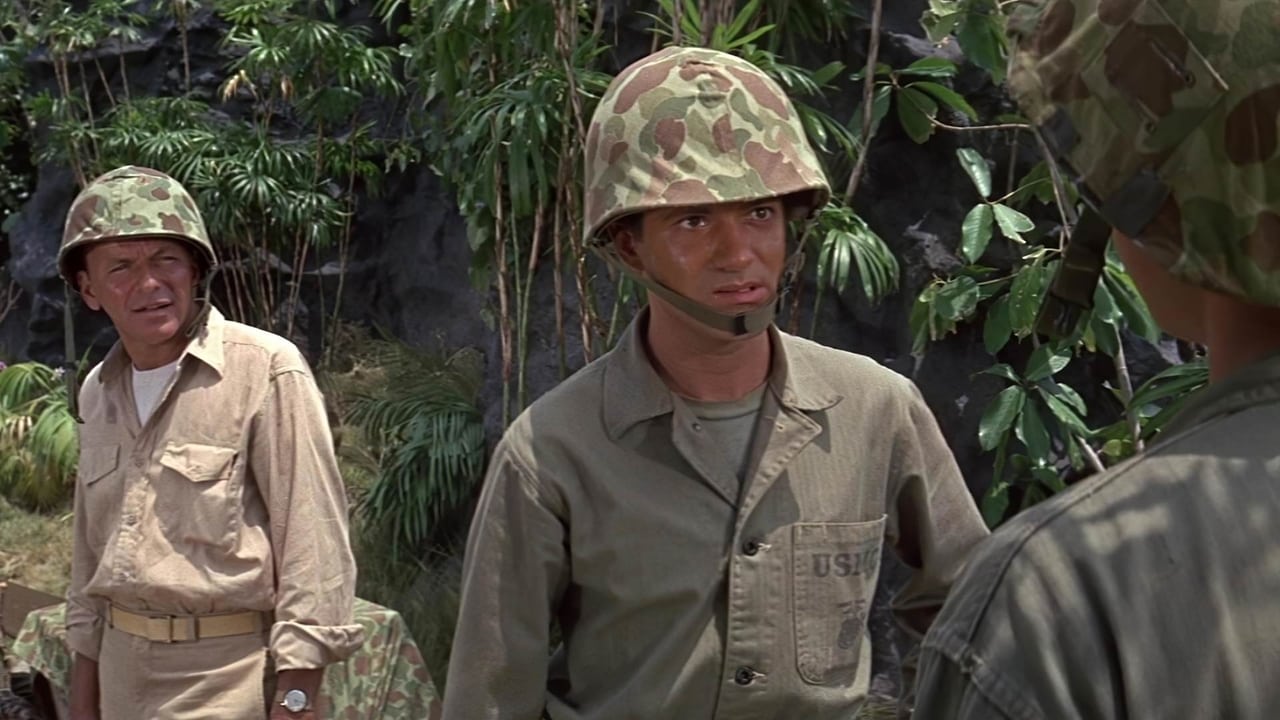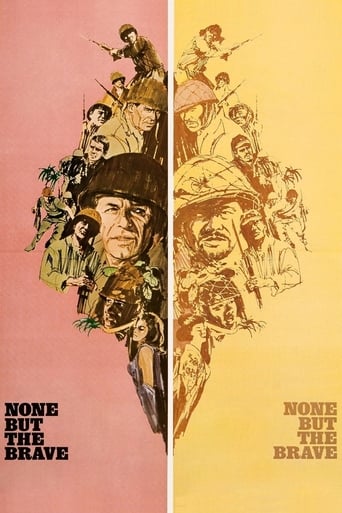

How would soldiers behave if they weren't forced to fight? It's a very thought-provoking question, one that's answered in the WWII drama None But the Brave. Frank Sinatra directed the film, and given the strong themes of friendship and loyalty present in the script, it's easy to see why he was drawn to it.A Japanese platoon is stranded on a tropical island, and as they try to build a boat to escape from the island and return to the war, an American plane crashes on the island. Both sides are isolated, and while at first they're hostile towards each other, as time passes with no rescue from either country, they agree to a temporary truce. As the friendship grows between the commanders and soldiers, there's a sense of dread and sadness looming overhead. If they are rescued, will they immediately become enemies again? Everything in this movie is shared equally between the Japanese and Americans, from the screenplay written by John Twist and Katsuya Susaki, to the dual languages present in the opening credits, to the similar dynamics between the commanders and their soldiers. While Tatsuya Mihashi has the largest role of the Japanese cast, and Clint Walker is the lead of the American cast, the entire ensemble cast gives very good performances. The slow change from wariness to trust is built steadily through the scenes, and as the men begin to dread a potential rescue, the audience feels it just as strongly.While there's very little fighting in this film, it's a very important war movie. If you think character development and internal tension are just as important as battle scenes, you're going to want to watch None But the Brave the next time you're in the mood for a WWII movie.
... View MoreI saw this for the first time today. Really wish I hadn't bothered. Acting is average to poor, especially poor from Tommy Sands. It's meant to be an anti-war film so there is lots of moralising about the point of it all. There isn't much point to this film though I don't think.Sinatra produces, directs and stars. Not one of his better performances. He plays a boozy doctor also named Francis like him !. When he isn't drunk and spouting moralising stories he manages to expertly amputate the leg of a wounded Japanese soldier.Others have mentioned Sands' performance. It really is awful and amateurish. Frank should have cut his whole sorry performance out and that would have improved the film...a bit anyway.There was also too much insubordination and disobeying of orders especially on the Japanese side I thought. I don't think the Japanese would have behaved like that with their code of honour and obedience.Overall a very poor film and maybe that was why Frank never tried directing again. Although to his credit he didn't try to come across as the big star and gave others a fair chance.
... View MoreAlthough he never had training or studied to be an actor, Frank Sinatra could act. With training and study, he may even have been a very good actor. Unfortunately, his very good acting was limited to just a few of his 60 plus film appearances. That's not to say he wasn't entertaining in a majority of his films. His musical movies were all quite good, with his singing and acting contributing, however much or little of the latter. Sinatra also was OK in those lightweight entertaining comedies of casino heists and similar flicks that he and his buddies seemed to have fun making. But in dramas or serious roles, Sinatra more often came up short. Two exceptions were his roles in "From Here to Eternity" for which he won the 1953 best supporting actor Oscar, and "The Manchurian Candidate." There was tough competition in the Academy Awards for 1962, but I think Sinatra was deserving of a nomination for his role in that film, which he didn't get. In his other military roles, Sinatra wasn't that good or believable. "Von Ryan's Express" was a big box office success in 1965, due mostly to a catchy story and some great performances by other actors – Trevor Howard, Wolfgang Preiss and others. Sinatra's sulky persona didn't seem real or believable for the highest ranking POW in the Allied Prisoner of War camp. In this film, Sinatra gives a so-so performance as Chief Pharmacist Mate Francis Maloney. But "None But the Brave" is lacking in some ways, especially in a few of the other roles and the directing. This was Sinatra's first try at directing. This is an interesting and different war flick that tells a story from both sides – the American and the Japanese. And, it respects the Japanese – one might say more so than the American Marines whose leaders are portrayed as inept and undisciplined. This was a joint American and Japanese project. It was released on screens in Japan ("Yûsha nomi") more than five weeks ahead of its February 24, 1965, release in the U.S. Nowhere could I find reference to any military advisers for the movie. I think that was a big mistake. Sure, Sinatra had a couple of war movies under his belt, but that didn't give him much savvy about the military. He didn't serve in the Armed Forces (a punctured eardrum is attributed with his being classified 4F), so he had no experience or first-hand knowledge about the military, deportment, etc. And he sure could have used it in this film. My dad was a near-career Army man who served in WW II and Korea. One brother was a Marine who served Viet Nam. Three of us were paratroopers – one of whom served in Viet Nam. To us and likely most other veterans, the portrayal of the Marines, especially the platoon leader and sergeant, was unreal and derogatory to the Corps. Any movie might show one person out of character, as happens in real life. But to have the green Marine lieutenant and his sergeant both lipping off and behaving badly is a real slam and highly unlikely. Tommy Sands is way over the top loud, obnoxious and dumb as 2nd Lt. Blair. It's not even right to refer to him as gung-ho. As Clint Walker's character, Capt. Dennis Bourke says, his men aren't Marines until they get some brains. Walker is an Army Captain and in real life there would be no question among any of the men that he would be the officer in charge. Yet Blair lips off at him, and Sgt. Bleeker (played by Brad Dexter) almost laughs at him. There were two other instances when grunt Marines disregarded orders – again, very unlikely as portrayed. Most of the Japanese actors were well-cast and very good. Although there, the Japanese sergeant also disobeys orders. One more role on the American side doesn't fit well. That's Walker as the Army pilot. This is a clear instance to me of miscasting. For one who remembers watching Cheyenne on TV (1955 – 1963) – well, the first five years of it before leaving home, it's hard to imagine Clint Walker as an airplane pilot and Army officer in WW II. He was a Teddy bear of a good guy, a beefcake who saved the local folk from the bad guys. He had that persona in most of the Western movies he was in as well. Walker was in "The Dirty Dozen" and wouldn't have fit very well there but for the fact that the majority of the cast were misfits intentionally. Most of the films Walker made outside of Westerns were flops, and he just doesn't have what it takes for serious drama or even comedy. He's right at home in a Western, but that's about it for Clint Walker. And, that's about it for my comments on this film, with these caveats. The action in this film is mostly good, except for the gyrenes standing up much of the time when they are returning fire with the Japanese. The filming location on Hawaii and the camera work are excellent. But, placing a latter day ideal for peace and humanity in a real combat time of WW II plays with emotions today and disregards the real emotions of the real protagonists of that time. As I said earlier, it's an unusual and interesting film.
... View MoreI don't think None But the Brave is a classic, but it certainly is not a bad film. Not at all, even if the pacing is uneven, the score a bit of a disappointment(John Williams has done much better work before) and Tommy Sands's character written not as well as it could have been, there is still a lot to like. Asides from Sands, who does his best with his role, if overdoing it sometimes, the other acting is very good, with Clint Walker giving the best performance as he performs with care and sensitivity and the Japanese actors doing very well. This is one of the cases where Frank Sinatra did a better job as director than as an actor, while he is decent in a secondary role, I found his direction much more impressive. The scenery is very nice to look at, and the story is strong. Also abundant are the likable script and while the secondary characters are a little clichéd some care has gone into making them not seem so. Overall, not absolutely wonderful, but definitely not bad. 7/10 Bethany Cox
... View More